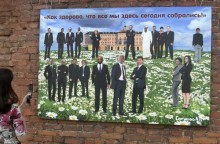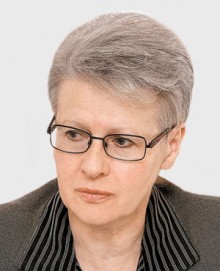A two-day summit of G20 “Group of Twenty” will begin on September 4 in Saint Petersburg. This will be the eighth meeting of the leaders of the world’s 20 leading countries in a format that was initiated five years ago. On the occasion of the upcoming event the address of the Russian President Vladimir Putin was published on the website of the Summit. Putin expressed his confidence in that “the forthcoming Leaders’ Summit in St. Petersburg will reaffirm the G20’s role as an efficient mechanism for coordinating the world’s leading economies’ policy approaches to global economy and finance.” Even though events of this type are usually devoted to the discussion of economic problems, observers do not rule out that this time the main theme of the summit might be the military operation in Syria.
The same opinion is shared by the press secretary of the Russian president Alexey Peskov, who noted in his Twitter: “Obama will try to use the G20 Summit to justify the attack on Syria. Whatever the program of Summit is planned it will be primarily about Syria.”
However, the aide of the Russian president Yuri Ushakov spoke less categorical and noted that the Syria issue is not on the agenda yet, but no one will restrict comments on this topic.
The Day asked the leading researcher of the Carnegie Center in Moscow Lilia SHEVTSOVA to comment on what Russia expects from the G20 Summit as a host and whether guests would raise the topic of Syria, would they beg Putin, as reported by the British newspaper The Guardian, to agree to Assad’s regime withdrawal from power.
“It is hard for me to say what Vladimir Putin and the Kremlin expect from the Summit, I can rather suggest what expectations the ruling team has. It wants to use its role of a host, first, to improve its image in the world and among the members of the G20. There is no doubt about that. But, I also think that Putin is rather pragmatic and he realizes that Russia will unlikely make any special contribution to the solution of the usual issues on the G20’s agenda, primarily, financial, and macro-financial issues. Speaking about Russia we mean the ruling team, because the Russian society is hardly well-informed of the G20, people do not know much about what the G20 is, and probably won’t remember any decisions made on any of the previous summits. That’s why we speak rather about the ruling team. And the ruling team wants to use the G20 as some kind of political Viagra which could revive and present it in the best light after a rather difficult period of the past two years, especially the complications in relations with Obama. Especially since Russia was fortunate to become a host of the G20. Before that Russia hosted APEC 2012, and soon Russia will host the G8 Summit. Russia will also host the Olympic Games in 2014. This combination of factors makes Russia, at least, the top newsmaker. However, it is still a big question what constructive contribution can Russia make to the agenda of G20 or G8. We can give one sure answer: the leaders who don’t have strategy for the development of their own country, are unlikely to produce any constructive proposals to offer to the world.”
Will world’s leaders discuss the Syria conflict during the Summit and particularly the information that Boris Yeltsin aide and former head of the Federation Council Shumeiko have been involved in supplying sarin to Syria?
“I think that all members of the G20 that will come to Russia are well informed of all the aspects of, first, the Russian-American relations and, second, of the role of Russia in supporting the Assad regime. But none of those leaders who will sit at the summit’s table will talk about unpleasant issues for Putin and will discuss these matters with the press. The only thing that can be annoying to Putin will be a meeting of Barack Obama with the representatives of the LGBT community and civil society. We still do not know which members of the civil society would agree to come to the meeting with Obama in the current situation, when they are all oppressed. That’s why I think that the issue of the use of chemical weapons will not even be in the air. Especially since there is no reason to think that Obama will meet with Putin somewhere in the fields of G20. They will avoid each other when possible. And it is unlikely that Obama will raise this issue. It is an extremely unpleasant situation for Russia. I heard an interview with the developer of chemical weapons Vil Mirzayanov, who lives in America and who told the story of how sarin was first produced and what are the components used to make sarin in Syria. That’s why, in any case, the role of Russia not only through the Security Council, its role in supplying Syria with all kinds of weapons, including air defense weapons, is well known. Another thing is that the international community and the West do not have a mechanism to address the Syrian problem.”
But the British newspaper The Guardian wrote on September 3 that the world leaders will try to convince Putin at the G20 Summit that the Assad regime must be withdrawn from power. What is your opinion on that?
“Perhaps, some of the members of the G20 could try to do so, although I can’t imagine who might dare do it. Most likely it can be Chancellor Angela Merkel. I don’t think it will be Cameron or absolutely gutless Hollande, and, of course, not Obama, since Obama neither wants nor has the ability to meet with Putin. It is possible that Angela Merkel will raise the issue of Syria. She raised this issue in a conversation with Putin during the most recent Russian-German summit. However, that meeting resulted in nothing. Judging by the mood of Putin, he is in hard and unwavering spirit. And the issue of Syria is the most annoying matter for Putin. The leaders who had a chance to speak with Putin realize that there is no sense in talking to him when he is annoyed. Peter Baker wrote in The New York Times referring to the sources in the US Administration that during the first official meeting with Putin, back at the time of Medvedev’s presidency, the first question he asked without saying ‘Hello’ was: ‘Are you going to bomb Syria?’ Obviously, this question is of crucial importance to Putin. Therefore, I don’t think that even if Merkel, the only brave person, raises this issue in a conversation with Putin, there would be any positive results from that.”
By the way, yesterday Putin said that he could agree to military action in Syria…
“It is hard to say what he meant. But if he came to the conclusion that America will inevitably launch its air strike on Syria, in this case, the entire situation puts Putin in a very awkward position. He can be left out. Especially since even the Kremlin is aware of the fact that the information obtained by French and American intelligence about the use of sarin by Assad’s regime against their own people, are quite reliable. Perhaps, Putin simply sends different messages in case different situations might occur, trying to ensure ways to retreat not to remain all by itself in a long term perspective. But we all know that America’s military attack on Syria, as well as the consequences of such attack, is still being considered. Because a single attack cannot cause much damage to the regime of Assad.
“The statement that Putin made is contrary to the logic of his behavior. If Americans attack, and, from what we understand, Assad dispersed his arms and covered them with civil population, this will not reduce the influence of Assad by any means. It will still exist. That’s why Putin will act like this. He will press another button saying: ‘I told you nothing would happen. I told you that military action will not succeed.’ I think that this mantra is more consistent with the logic of his behavior.”









